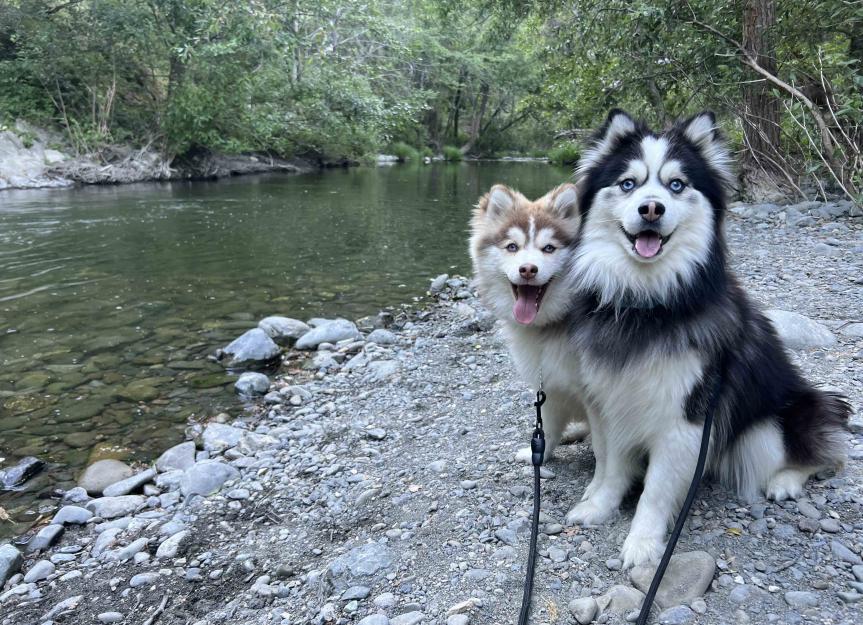Pomskies, the adorable mix of Pomeranian and Siberian Husky, have captured the hearts of many pet lovers. But if you’re a cat owner considering adding a Pomsky to your family, you may wonder if they will get along. The answer is not a simple yes or no, as it depends on several factors. Let’s dive into the world of Pomskies and their compatibility with cats.
Understanding Pomskies
Pomskies are a relatively new breed that has gained popularity since 2012. Being a crossbreed, they inherit traits from both their Pomeranian and Siberian Husky parents. These lovable dogs have a larger-than-life personality packed into a petite body. With their cute wolf-like appearance and amusing antics, Pomskies can bring joy to any home.
Caring for a Pomsky
Like their parent breeds, Pomskies are highly intelligent and attached to their humans. They thrive on attention and require mental and physical stimulation to stay happy and healthy. Early training and socialization are crucial for their development, as boredom can lead to behavior issues.
While Pomskies generally get along well with humans and other dogs, introductions to cats and small pets may require more time and supervision. By taking a consistent approach and seeking professional help if needed, Pomskies can become fabulous companions for cats and other pets.
Pomsky Health Issues
Pomskies are considered a generally healthy breed, with an average lifespan of 12-15 years. However, like any breed, they may be predisposed to certain health conditions. It’s important to be aware of these potential issues and monitor your Pomsky’s health closely. Common health issues reported in Pomskies include:
Patellar Luxation
Patellar luxation, or dislocation of the kneecap, is a common orthopedic condition in both Pomeranians and Huskies. Symptoms may include limping, bunny-hopping, and a popping or cracking knee joint. Severe cases may require surgical intervention.
Allergies
Pomskies, like humans, can develop allergies to various substances. Allergies may manifest as inflamed and itchy skin, recurring ear infections, hair loss, and other symptoms. Managing allergies may involve identifying and avoiding allergens, controlling itching, keeping the coat clean, and using medication or immunotherapy.
Hip Dysplasia
Hip dysplasia occurs when the hip joint doesn’t develop correctly, leading to instability and potential long-term joint damage. Symptoms may include limping, trouble walking, and hip pain. Responsible breeders often use DNA testing to minimize the risk of passing on hip dysplasia.
What To Feed a Pomsky
Proper nutrition is essential for the overall health and well-being of your Pomsky. Consult with your veterinarian to determine the best food for your Pomsky based on their age, size, and health history. When transitioning to a new diet, do it gradually to avoid upsetting their stomach.
Behavior and Training Tips for Pomskies
Training and socialization are vital for Pomskies, given their intelligence and energy levels. Early training helps them become well-behaved and adaptable companions. Pomskies thrive with regular physical exercise, mental stimulation, and human interaction. Spending quality time with your Pomsky will allow you to appreciate their fun and spunky personality.
Pomsky Grooming Guide
Pomskies have a double coat that requires regular care. Most Pomskies benefit from brushing two to three times a week using an undercoat rake or slicker brush. Additionally, they should be bathed about once a month. The exact grooming routine depends on the coat type, which can be standard, plush, or wooly.
Considerations for Pet Parents
Pomskies are energetic, intelligent, and require companionship. They can adapt well to various living environments, including homes with children and other pets. However, it’s important to meet their mental and physical activity needs through daily walks, training sessions, and engaging activities. Pomskies are not considered high-maintenance but do shed, so regular brushing is necessary.
Frequently Asked Questions
- Can Pomskies live with cats?
- How do I introduce my Pomsky to my cat?
- Do Pomskies get along with other small pets?
- Are Pomskies good for apartment living?
- What is the average lifespan of a Pomsky?
- How much exercise do Pomskies need?
- Are Pomskies hypoallergenic?
- How often should I groom my Pomsky?
Conclusion
Pomskies can make wonderful additions to households with cats, but it requires patience, supervision, and proper introductions. With early training, socialization, and enough mental and physical stimulation, Pomskies can coexist harmoniously with cats and other pets. If you’re considering adding a Pomsky to your family, ensure you provide them with the love, care, and attention they need to thrive.
For more information about Pomskies and other pet-related topics, visit Pawsoha.
